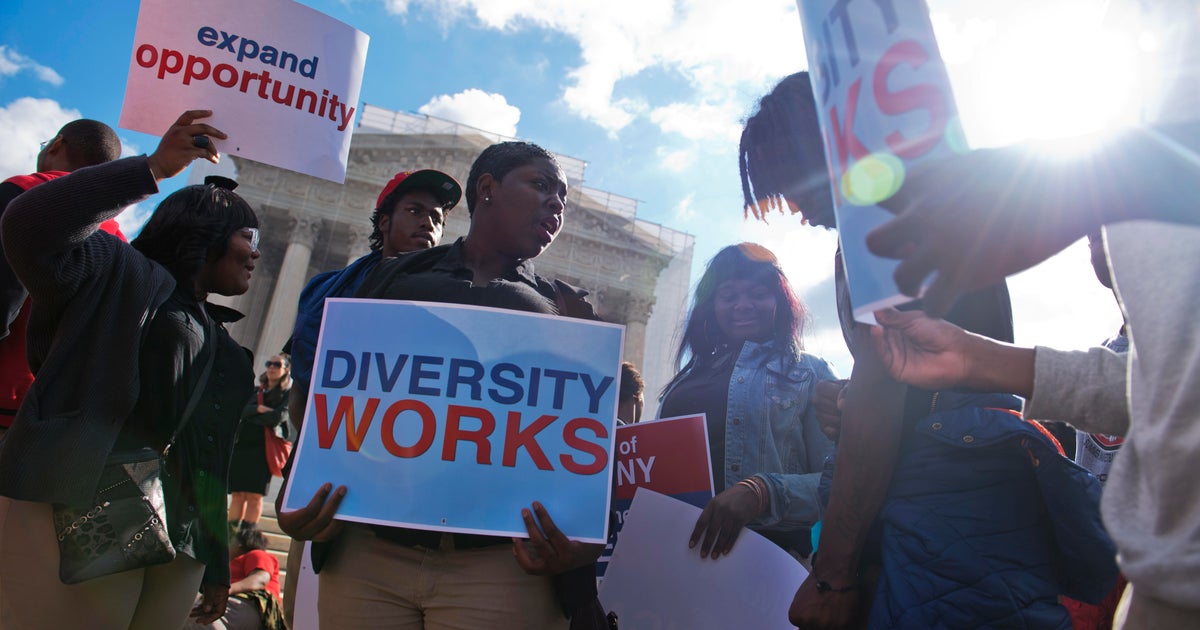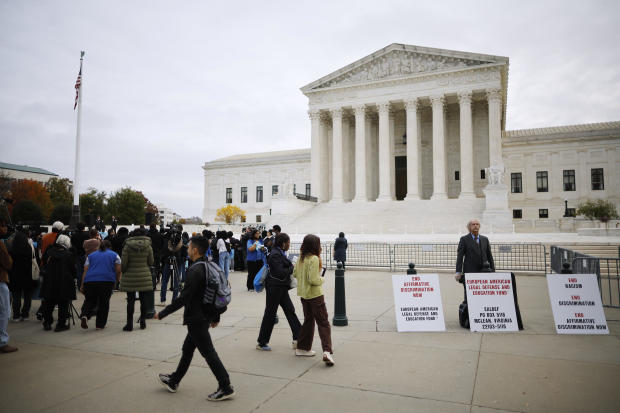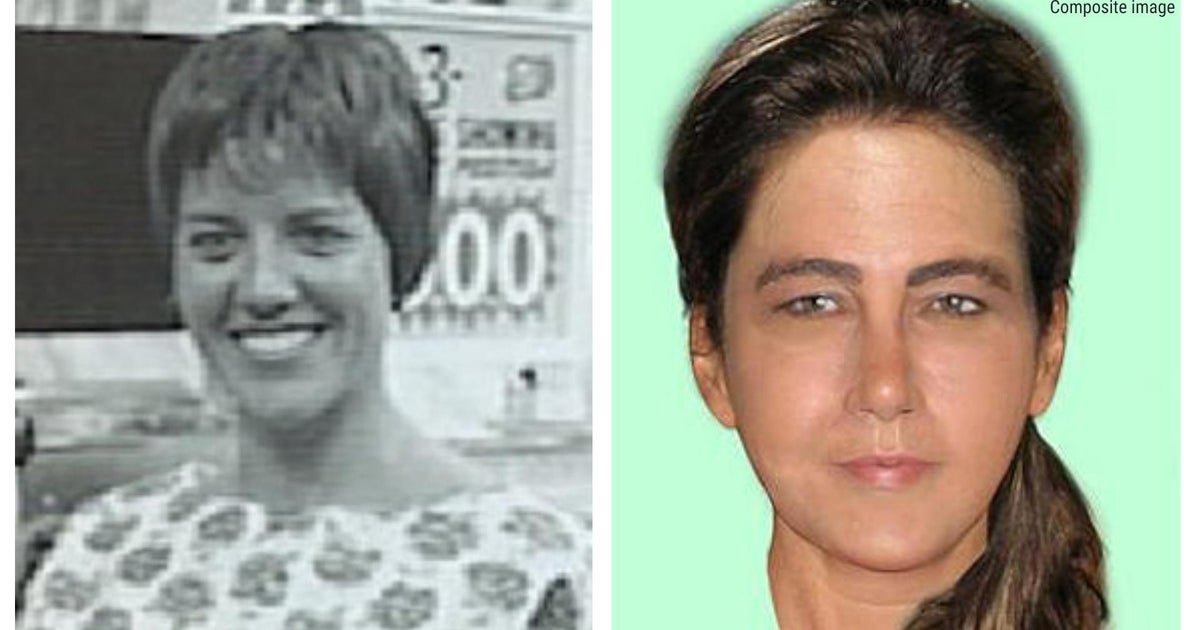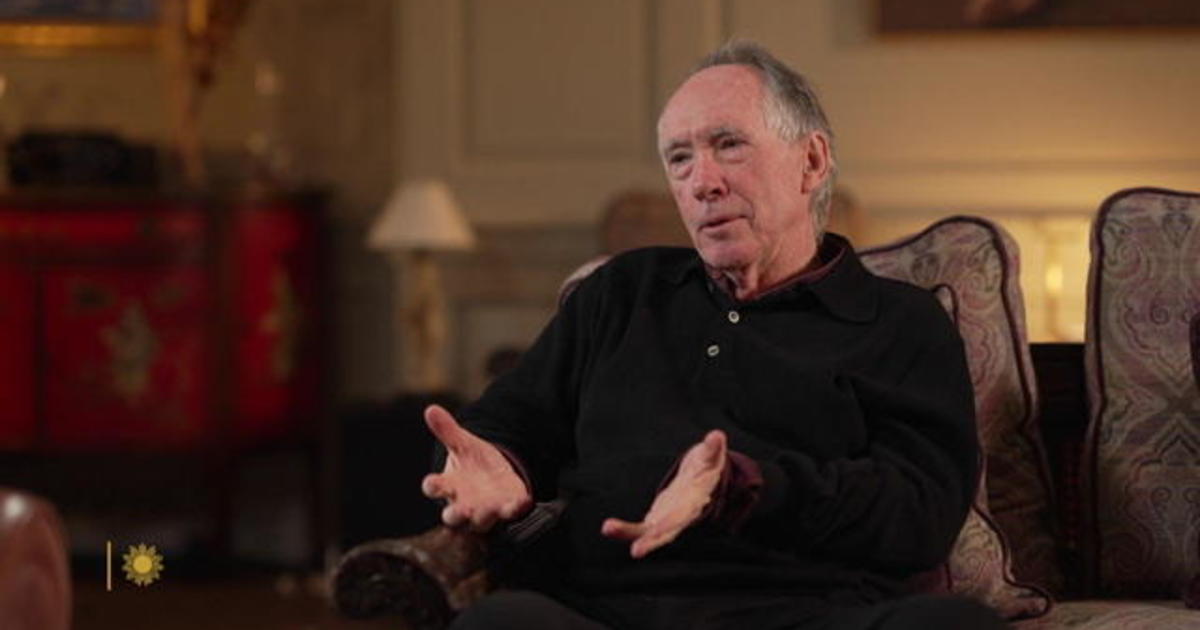The Supreme Court is considering the repeal of affirmative action in the field of higher education

Washington – The Supreme Court on Monday decided whether to overturn racially biased admissions programs after hearing arguments in a pair of cases challenging affirmative action in higher education.
A legal battle involving the admissions policies of the University of North Carolina, the nation’s oldest public university, and Harvard, the oldest private institution, has come before the Supreme Court, which has been dramatically reshuffled since it last heard the matter just six years ago. And in just under five hours of arguments in the two cases, members of the conservative six-judge panel expressed skepticism that universities should continue to consider race as a factor in admissions.
“Why do you have these boxes? Why do you give a student the opportunity to say one thing about me: “I’m Hispanic, I’m African American, I’m Asian?” What does that say in itself?” Judge Samuel Alito asked.
Justice Clarence Thomas wondered: “I’ve heard the word ‘diversity’ quite a few times and I have no idea what it means. It seems to mean everything to everyone.” He has repeatedly asked lawyers who favor race-based admissions procedures to clarify the educational benefits that the Supreme Court has argued in past decisions justify limited consideration of race in admissions.
At various points during the arguments, Justices Brett Kavanagh and Amy Coney Barrett questioned whether universities would ever reach a point where they would no longer need to consider racial preferences in the pursuit of higher education diversity.
“How will we know when the time comes?” Cavanaugh asked Solicitor General Elizabeth Prelogar, who was speaking on behalf of the Biden administration. The Justice Department is backing the colleges in the legal battle and has argued that the diversity of the military’s officer corps serves a “critical national security interest.”
Chip Somodevilla/Getty Images
Kavanaugh and Barrett cited Justice Sandra Day O’Connor’s proposition in Grutter v. Bollinger, a 2003 decision that held that the narrow use of race in admissions decisions is constitutionally permitted, that “after 25 years, the use of racial preferences more will not be needed.”
Noting the claim in Grutter that the use of racial classifications is “very potentially dangerous,” Barrett also questioned the “logical end point?”
“When will it end? When is your sunset? When will you know?” she asked. “Because Gruter makes it very clear that it is very dangerous. Grutter doesn’t say it’s great, we accept it. Grutter says it’s dangerous and it has to come to an end.’
Barrett said the 19-year-old decision may have been “too optimistic” in setting a 25-year time frame for achieving student body diversity, adding, “What if there’s no end point?”
The lawsuits surrounding the admissions programs at Harvard and the University of North Carolina are the culmination of decades of efforts by conservative activist Edward Blum to end the use of racial preferences in American life. Although he lost a 2016 challenge to the University of Texas’ race-based admissions, Blum is now on the verge of declaring victory in cases brought by the group he co-founded, Students for Fair Admissions.
During oral arguments, the court’s three liberal justices and attorneys for the schools emphasized the importance of ensuring diversity in higher education and said that race-based admissions policies are necessary to fully understand the backgrounds and experiences of students. However, they have repeatedly emphasized that race is not the only factor that determines whether a student will be accepted.
“Race alone does not determine why someone is or is not admitted,” said Justice Sonia Sotomayor. “There’s always a confluence of reasons. There are any number of Hispanics, blacks, Native Americans who don’t get picked on by schools.”
Justice Ketanji Brown Jackson, the Supreme Court’s new justice and the first black woman to serve on the court, said she was concerned that if a university could no longer consider race as a factor in the holistic admissions process, but could consider other characteristics such as whether whether they served in the military, or whether their parents attended school, this can cause new legal problems.
She posed a hypothetical scenario involving two students from North Carolina who want to emphasize their family background during the application process. The first applicant’s family has lived in the state for generations dating back to the Civil War and wishes to honor their family heritage by attending the University of North Carolina. The second applicant, whose family has also been in the state for generations, is a descendant of slaves and would like to attend the school to honor his family heritage.
“As I understand your race-insensitive admissions rule, these two applicants will have a dramatically different opportunity to tell their family stories and make them count,” Jackson told Patrick Strawbridge, who spoke on behalf of Students for Fair Admissions. “The first applicant could have his family background taken into account and assessed by the institution when considering whether to accept him, whereas the second applicant could not because his background is very much related to his family and ancestors”.
Jackson, who was only involved in the dispute over the University of North Carolina’s admissions program, also questioned the plaintiffs’ right to file the case in the first place, noting that the university’s admissions office considers race along with dozens of other factors when reviewing student applications.
“You did not demonstrate or show one situation in which everyone [admissions officers] look at race and take stereotypes and other things from it. They’re looking at a complete person with all those characteristics,” Jackson said.
But conservative judges and lawyers for the student group said the school’s admissions policy unconstitutionally discriminates against students based on race, and argued that eliminating race-based admissions would not significantly harm diversity at colleges and universities.
Chief Justice John Roberts noted that in some cases, a highly qualified applicant will determine whether he is accepted to Harvard. Seth Waxman, who appeared on behalf of Harvard, told the court that some factors may be more favorable to the applicant – such as a student who can play in the university orchestra – depending on the circumstances.
“We didn’t have a civil war over oboists. We fought a civil war to eliminate racial discrimination, and so this is a significant concern,” Roberts said.
Strawbridge said the school “makes distinctions in who it admits based, at least in part, on the race of the applicant. Some races get benefits, some races don’t get benefits.” While he pointed to modeling showing that race-neutral recognition could achieve the same diversity as race-based considerations, Justice Sonia Sotomayor called the claim “unrealistic at best.”
Sotomayor, Jackson and Justice Elena Kagan peppered Strawbridge with questions about how and whether universities can even consider race in admissions.
Kagan strongly defended the benefits of higher education institutions seeking diversity in their student bodies and the broad range of stakeholders it affects.
“These are channels to leadership in our society. It could be military leadership. It can be leadership in business. It can be leadership in law. It can be leadership in many different areas. Universities are a conduit to that leadership,” she said. “I thought part of what it means to be American and to believe in American pluralism is that really our institutions, you know, reflect who we are. “we are as people in all our diversity.”
A Supreme Court decision is expected this summer.
https://www.cbsnews.com/live-updates/supreme-court-affirmative-action-cases-college-admissions-north-carolina-harvard/



